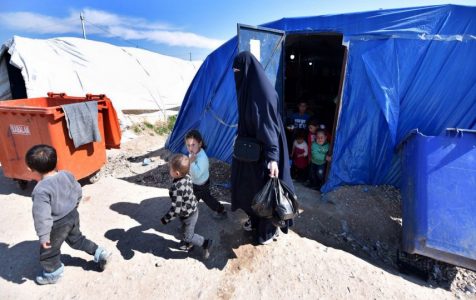
At least 800 women and children including ISIS relatives to leave Syrian camp
Kurdish authorities in Syrian Kurdistan (Rojava) in northeast Syria said Sunday they plan to hand 800 women and children, including relatives of jihadists, to their families in the first such transfer from an overcrowded camp.
The women and children — all Syrians — are living among the dregs of the Islamic State group in the Kurdish-run Al-Hol camp, home to nearly 74,000 people including more than 30,000 Syrians.
They will leave on Monday and be “taken to their families” at the request of local Arab tribes, according to Abd al-Mehbach, co-chair of the Kurdish administration’s executive council.
The move follows an agreement brokered by the Kurdish administration and Arab tribal leaders during a meeting in the town of Ain Issa last month.
It is to be the first in a larger wave of releases that aim to empty Al-Hol of its Syrian residents, he said.
The next batch is expected to follow after the Eid al-Fitr holiday due to start sometime in the next few days marking the end of the Muslim holy month of Ramadan.
Hoovered up during a final offensive against the jihadists by a US-backed Kurdish-led force, thousands of wives and children of IS fighters have been trucked into Al-Hol from a string of Syrian villages south of the camp in recent months.
Their numbers have created a major headache for the semi-autonomous Kurdish administration and have sparked concerns that the camp is emerging as a fresh jihadist powder keg.
‘Our sisters, our mothers’
But “not all of those being released are relatives of IS fighters,” Mehbach said of the group set to leave Monday.
Some sought shelter at the camp to escape tough humanitarian conditions in areas levelled by months of fighting, he said.
Monday’s group consists of residents from the northeastern city of Raqqa — once IS’s de facto capital in Syria — as well as the town of Tabqa, 70 kilometres (43 miles) west, according to Mehbach.
Those among them with suspected links to IS will be kept under surveillance by local Arab tribes, who have given guarantees, he said.
“It is the (Kurdish) administration’s duty to its people to play a role in the rehabilitation of these women and children, and their reintegration into society,” he added.
A Raqa tribal leader, Ali Mahamid Ali, said that Arab tribes are trying to secure the release of all Syrian women held in Al-Hol.
“They are all our sisters, our mothers,” he said.
“We gave guarantees… the (women and children) will be released under our responsibility.”
The IS proto-state was declared defeated on March 23, following a nearly five-year-long offensive against the group.
Thousands of foreign fighters are being held in Kurdish-run prisons, while their wives and children languish in displacement camps.
Among the hordes of Syrians and Iraqis, some 12,000 foreigners are held in a fenced-off section of the Al-Hol camp, under the watch of Kurdish forces.
U.S. has for years supported the Kurdish-led Syrian Democratic Forces (SDF) in the fight against the Islamic State group in Syria, as part of an international anti-jihadist coalition dominated by the Kurdish People’s Protection Units (YPG). But U.S. President Donald Trump abruptly announced the pullout from Syria.
The Kurdish PYD and its powerful military wing YPG/YPJ considered the most effective fighting force against IS. The YPG, which make up the backbone of the SDF forces, has seized swathes of Syria from Islamic State.
Source: Ekurd





